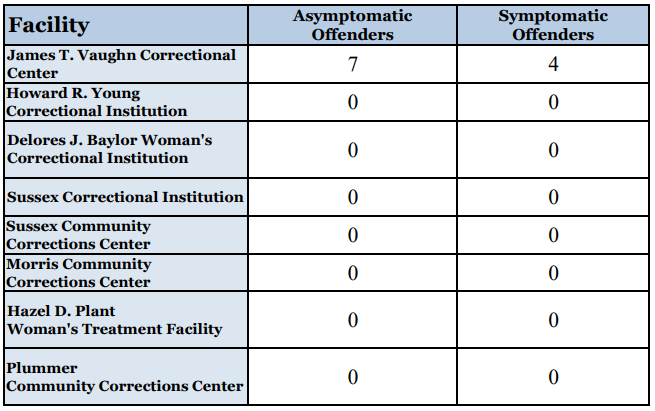The Delaware Department of Correction (DOC) today announced that Joseph R. Slider, a 60-year-old inmate with underlying health conditions from James T. Vaughn Correctional Center (JTVCC), died on Wednesday evening, May 27 at Bayhealth Hospital, Kent Campus from complications from COVID. Slider was part of a medium-security housing unit that has been closely monitored for several weeks, with twice-daily temperature checks. When daily monitoring revealed that Slider was registering a fever on May 11, he was immediately moved to the prison infirmary and administered a rapid COVID test, which returned a positive result. He was admitted to Bayhealth Hospital, Kent Campus for treatment on May 14. While hospitalized, Slider’s condition deteriorated and he had been on a ventilator for the past several days. The DOC had arranged video visitation with Slider’s family as his condition became critical.
Man Shot His Wife Thinking She Was A TV Character Who Killed His Mother
Slider, of Claymont, DE, has been in DOC custody since 2018 and was serving a 20-year sentence for 2nd Degree Murder and Possession of a Firearm During the Commission of a Felony. His body has been released to the Delaware Division of Forensic Science.
DOC also announced that:
130 inmates have now recovered from COVID-19.
Only 4 inmates with COVID are experiencing any symptoms across all DOC facilities, while 7 additional inmates who have tested positive are asymptomatic of illness. All 11 inmates with COVID today come from 2 isolated housing units at JTVCC.

“Our aggressive screening, monitoring, testing, and tracing efforts have helped us reduce the number of new COVID cases in our correctional facilities to the low single digits during recent weeks,” said Commissioner Claire DeMatteis. “There are only 4 inmates with COVID today who have any symptoms of illness; 2 are receiving treatment in an area hospital and 2 are being housed in our COVID Treatment Center along with the remaining 7 inmates who have tested positive for COVID but have no symptoms.”
The Department of Correction said they are doubling the safeguards recommended by the CDC to determine when inmates have recovered from COVID-19 and are safe to be taken out of isolation, by requiring that 14 days, rather than 7 days, have passed since the positive COVID test was administered, that 3 days have passed during which the patient remains fever and symptom-free AND that a follow-up COVID test returns negative. For inmates with immunocompromised underlying health issues, DOC has adopted an even stricter recovery standard of 21 days.
The DOC is employing a variety of prevention, screening, cleaning and containment measures to guard against the spread of the novel coronavirus, including:
All persons, including Officers, administrative staff and probationers who enter any Level V prison, Level IV violation of probation or work release center, or Probation and Parole Office are screened for COVID-19, including a series of questions and a forehead temperature check with a thermometer
Staff who present with symptoms are sent home to self-quarantine and directed to contact their health care provider.
Newly arriving inmates are held in isolation for the first 14 days, during which they are carefully monitored, including daily temperature checks with a thermometer.
DOC has implemented extra daily cleaning of DOC facilities and is using specialized fogging machines to disinfect entire rooms of common areas, housing units and workspaces.
Face masks are being worn by Correctional Officers and contract healthcare workers as a protection for inmates, Officers and other employees. All Correctional Officers have been wearing face masks since April 10.
Face masks have been provided to more than half of DOC’s inmate population, including inmates who are in infirmaries, those with compromised immune systems, those with certain institutional jobs, such as food service, all inmates at the James T. Vaughn Correctional Center and the Sussex Community Corrections Center and nearly 250 inmates at Howard R. Young Correctional Institution.
Most Probationer visits with Probation Officers were transitioned to phone check-ins in March to support social distancing measures.
In addition, the DOC has temporarily suspended in-person prison programming to reduce the movement of people into facilities and movement of groups of people within facilities. Certain programs, including treatment and education programs and religious programming, have been transitioned to a virtual video format. Inmates continue to have outside recreation opportunities within their confined areas and continue to have access to phones to stay in regular contact with their loved ones. DOC is also expanding the use of electronic tablets among the inmate population, where available.
Source: DOC

